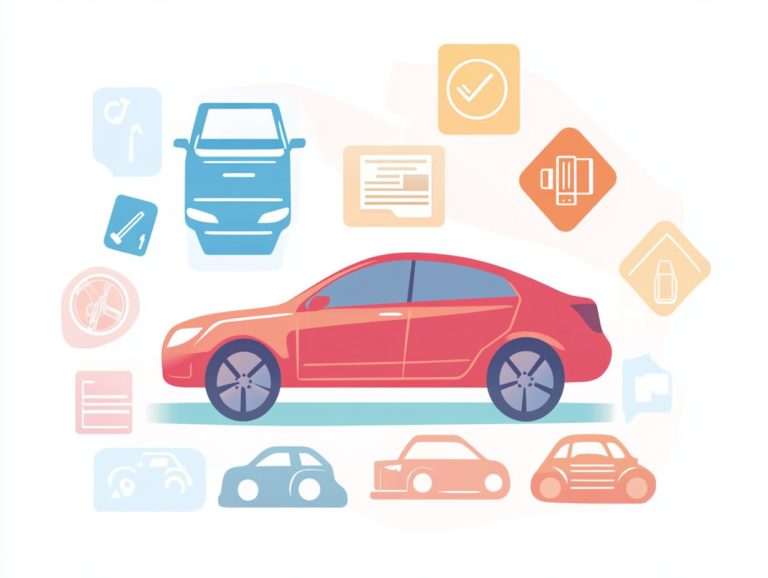Mastering Car Price Negotiation Techniques
Purchasing a car can be an exhilarating yet intimidating journey, particularly when it comes to negotiating the price. Grasping the intricacies of the car buying process is crucial for making informed choices and securing the best deal available.
This guide will empower you with essential steps, from conducting market research to preparing for negotiations and finalizing the purchase. Equipped with effective strategies and insightful tips, you ll be ready to confidently and successfully navigate the complexities of buying a car. Get ready to enjoy the thrill of negotiating your dream car!
Contents
- Key Takeaways:
- Understanding the Car Buying Process
- Preparing for Negotiations
- Effective Negotiation Techniques
- Closing the Deal
- Ensuring a Smooth Transaction
- Additional Tips for Successful Negotiations
- Handling Rejection and Staying Confident
- Avoiding Common Negotiation Mistakes
- Frequently Asked Questions
- What are some techniques for mastering car price negotiation?
- Is it possible to negotiate the price of a new car?
- How can I use my budget to negotiate the price of a car?
- What is the market value of a car and how can it help me negotiate?
- Can I negotiate the price of a car without cash?
- How can I take charge during car price negotiations?
Key Takeaways:

Research is key to successful car price negotiation. Know the car’s market value and your budget beforehand. Build rapport with the seller by being friendly and respectful. Utilize strategies for negotiating the best price on your new car by using leverage and asking for discounts to secure a better deal. Be confident and handle rejection gracefully. Avoid common negotiation mistakes to ensure a smooth transaction when closing the deal.
Understanding the Car Buying Process
Understanding the car buying process is essential for anyone eager to negotiate a successful deal. This journey begins with useful negotiation tips for luxury car buyers long before you set foot in a dealership.
It involves important steps such as researching the market value of both new and used cars and establishing your budget. Familiarize yourself with various financing options, potential dealership fees, and payment terms to ensure a seamless transaction.
You should be informed about trade-ins, appraisals, and inspections. This knowledge can dramatically influence your overall savings and affordability throughout your car buying experience.
Key Steps and Considerations
Before finalizing your car purchase, there are several key steps and considerations you should keep in mind. Your journey begins with thorough research, diving into budgeting and financing options while exploring the myriad vehicle types available on the market.
Immerse yourself in customer reviews and expert comparisons to evaluate reliability and performance. Don t overlook the importance of vehicle history reports; they can unveil crucial details about past accidents or repairs that might impact the car’s long-term viability.
Having the car inspected by a trusted mechanic is a wise move to ensure any unforeseen issues are addressed. Additionally, utilizing online appraisal tools will help you gauge fair market value, enabling you to negotiate with confidence.
Preparing for Negotiations
Preparing for negotiations is essential for you to approach dealerships with the confidence needed to secure the best deal possible. This means diving deep into research on the market value of the vehicles you desire, grasping the financing options at your disposal, and establishing a realistic budget that factors in monthly payments as well as potential dealership fees. Additionally, reviewing the do’s and don’ts of negotiating car prices can further enhance your strategy.
Furthermore, developing effective negotiation tactics will enable you to advocate for a fair deal while maintaining a composed demeanor throughout the process.
Researching the Car and Market
Researching the car and market is a crucial step in your car-buying journey that can significantly impact your negotiation power. By tapping into reputable resources like Kelley Blue Book, Edmunds, and Autotrader, you can find important information about current car prices.
These platforms offer comprehensive details on both new and used vehicles, allowing you to grasp their worth based on various factors such as make, model, year, and condition. By familiarizing yourself with these pricing landscapes, you position yourself to make informed decisions, ensuring you neither overpay nor miss out on exceptional deals.
Understanding market values enables you to negotiate better, paving the way for more favorable outcomes.
Setting a Budget and Knowing Your Limits

Setting a budget and knowing your limits are key steps in buying a car. They help you avoid overspending.
A realistic budget involves understanding monthly payments and potential trade-in values. It also includes exploring financing options.
By incorporating a monthly payment plan into your budget, you can manage expenses effectively. Assessing trade-in values can influence the total cost and offer a more approachable price point.
Exploring different financing options is crucial. Varying interest rates and loan terms can ease or tighten your budget, so align these factors for a seamless purchasing experience.
Effective Negotiation Techniques
Mastering winning techniques for online car negotiation will enhance your experience when buying a vehicle. Use strategies like staying silent after your offer and showing confidence.
Tailor your tactics to the situation at hand to sway the terms in your favor. Understanding negotiation psychology helps you create win-win scenarios with sellers.
Building Rapport with the Seller
Building rapport with the seller creates trust and encourages open communication. A positive relationship can lead to better negotiation outcomes.
When both parties feel understood, they are more likely to reach mutually beneficial agreements.
Techniques like active listening and showing genuine interest can foster trust. A friendly demeanor goes a long way in easing potential hurdles.
Using Leverage and Asking for Discounts
Using leverage and asking for discounts can save you money. Timing is key watch for signs like the seller’s urgency to close the deal.
Recognizing when to apply these tactics requires keen observation. Factors like market demand can influence your approach.
Understanding the difference between negotiating with private sellers and dealerships is vital. Private sellers may have emotional attachments, while dealerships often have flexible margins.
Closing the Deal
Closing the deal is crucial. You’ll finalize the price and payment details during this phase.
This stage typically involves negotiating the out-the-door price, which includes all fees, taxes, and costs.
Ensure the vehicle has passed inspection and meets all requirements before signing to avoid buyer’s remorse.
Finalizing the Price and Terms

Finalizing the price is a key moment in your car-buying journey. Understanding dealership fees can significantly affect your final price.
Arming yourself with market research will bolster your negotiation tactics. Consider manufacturer incentives like cashback offers; these can greatly improve your deal.
Ensuring a Smooth Transaction
A smooth transaction is essential when buying or selling a car. It ensures everything goes efficiently and without complications.
This involves gathering important documents, such as title paperwork, registration papers, and maintenance records that highlight the vehicle’s history.
Final inspections are crucial, allowing both you and the seller to evaluate the car’s condition before closing the deal. This helps avoid potential disputes or disappointments later on.
Clear communication is vital; when you and the seller openly discuss the transaction details, any lingering doubts can be addressed. This builds a foundation of trust and understanding.
This collaborative approach enhances the transaction experience and lays the groundwork for satisfaction on both sides.
Additional Tips for Successful Negotiations
These tips can boost your confidence and effectiveness during the car buying process.
Learning to handle rejection while staying positive is essential. This enables you to walk away from deals that don t meet your expectations.
By avoiding common negotiation pitfalls like neglecting thorough research or rushing into decisions you can significantly improve your overall negotiation experience.
Handling Rejection and Staying Confident
Handling rejection is an inevitable aspect of negotiation. Maintaining confidence in your position is key for a successful car-buying experience.
To navigate the emotional turmoil that often comes with rejection, adopt a growth mindset. View each setback as an opportunity for learning, not a sign of failure.
Focus on your personal strengths and preparation to better manage your emotions. This helps you maintain a composed demeanor during negotiations.
Practicing active listening and staying open to feedback fosters better communication and enhances your resilience an essential quality for achieving your desired outcomes.
Ultimately, cultivating these skills creates a more positive negotiation atmosphere, leading to better deals and greater personal satisfaction.
Avoiding Common Negotiation Mistakes
Avoiding common negotiation mistakes is crucial for achieving favorable outcomes during the family car purchasing process.
Understanding pitfalls, like neglecting thorough research on vehicle pricing and dealership reputations, allows you to navigate the negotiation landscape with greater ease. For detailed strategies, check out best practices for car negotiation.
Many buyers underestimate the importance of preparation, often entering discussions without a clear budget or knowledge of current market trends. This lack of insight can lead to accepting unfavorable terms or missing out on better deals.
To sidestep these issues, gather information in advance, establish firm pricing boundaries, and practice effective negotiating techniques. For those looking to improve their skills, negotiating the best price on a used vehicle can significantly impact your experience. Being well-prepared boosts your confidence and sets the stage for securing the best deal possible.
Frequently Asked Questions

What are some techniques for mastering car price negotiation?
Techniques for mastering car price negotiation include researching the market value of the car, having a firm budget, and being ready to walk away if the seller won’t negotiate. For more insights, check out the art of negotiating car prices.
Is it possible to negotiate the price of a new car?
Yes, it is possible to negotiate the price of a new car. While the markup on new cars is generally smaller than for used cars, there’s still room for negotiation. Researching and being prepared is crucial for getting the best price.
How can I use my budget to negotiate the price of a car?
Having a firm budget gives you leverage when negotiating the price of a car. Inform the seller of your budget and be prepared to walk away if they are unwilling to meet it.
What is the market value of a car and how can it help me negotiate?
The market value of a car is the average price that others are paying for the same make and model. Knowing this helps you negotiate a fair price and avoid overpaying.
Can I negotiate the price of a car without cash?
Yes! You can negotiate using non-monetary factors. For example, ask for extra services like a free oil change or an extended warranty.
How can I take charge during car price negotiations?
Stay confident in your research and budget. Keep a calm demeanor and be prepared to walk away if the seller doesn’t meet your needs.






